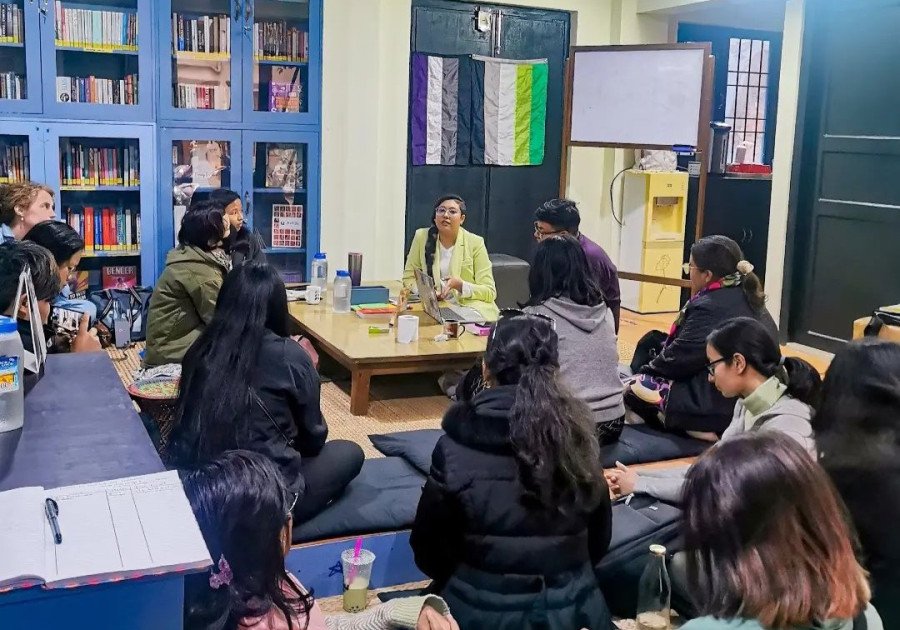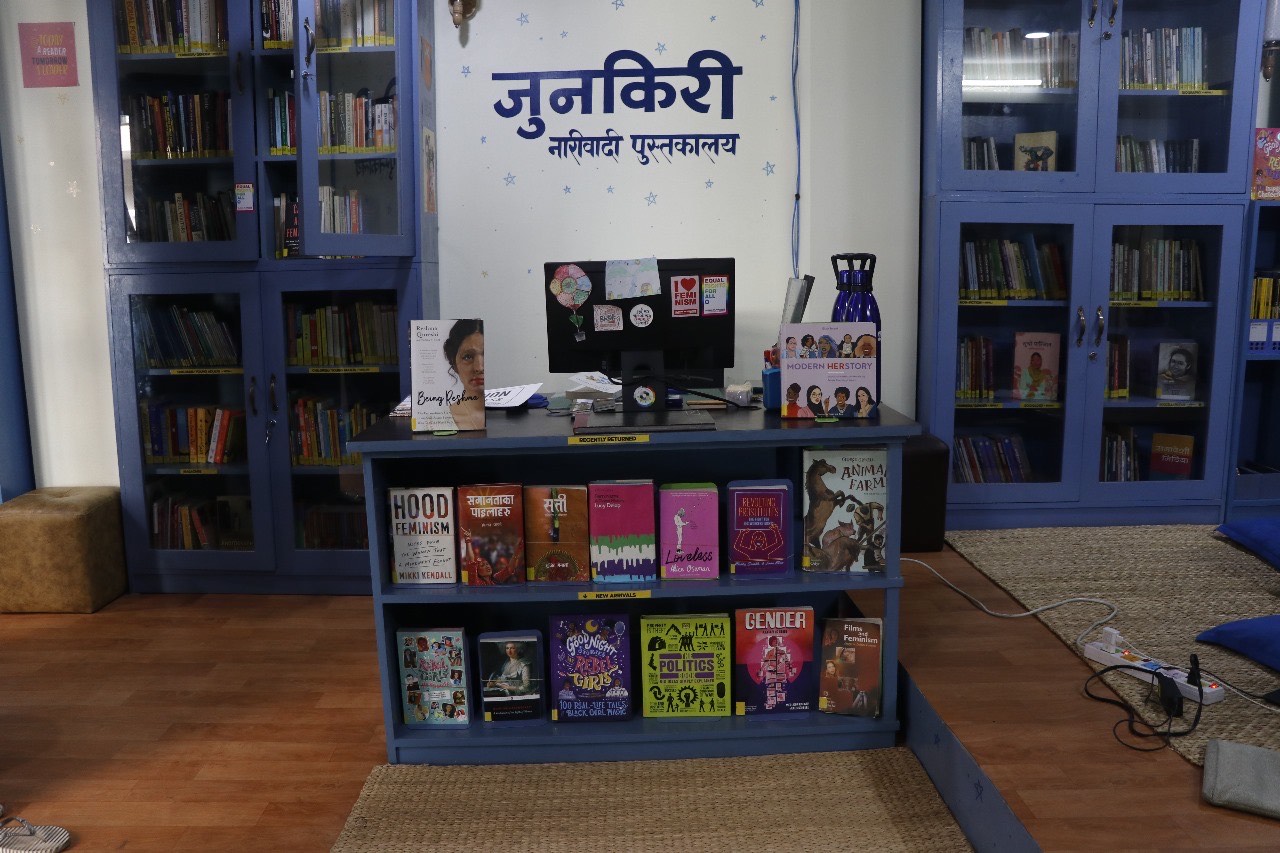Books
Feminist pedagogy through Junkiri
The library is a community space that illuminates feminist issues through its thoughtfully curated collection of books.
Anusha Dhakal
Bright blue bookshelves, a sunny courtyard, and a friendly librarian—Junkiri: The Feminist Library is a vibrant and welcoming communal space located in Dhokatole, Kathmandu. Currently, it houses more than 2,500 books and has over 700 members.
This library is an initiative of VOW (Voices of Women) Media that aims to increase feminist education by providing easy access to feminist literature, tools and resources to women and girls.
The library initially opened on March 8, 2020, but unfortunately, due to lockdown, it had to close down just two weeks later, on March 23. However, in August 2022, the library resumed its operations, welcoming readers back once again.
Libraries have never been a neutral space. They have always, in some ways, reflected the various biases, values and power structures of their communities. Not only is there a bias in the selection of library material, but there is also a bias in cataloguing and categorisation. Most notably, the Decimal Dewy System is known to have significant biases against marginalised communities. For example, pregnancy, quite outrageously, is categorised in the disease section through this system.
Historically, male authors have dominated intellectual life, which is why it is so crucial to amplify the voices of women through literature and libraries that promote works written by women. Education is a site for social change and transformation, and access to feminist education is crucial in increasing feminist consciousness.
In Nepal, the urgency for a feminist library is greater than ever. While progress has been made in areas such as legal reforms and women’s representation in politics, it is still difficult for many people to understand basic concepts like consent and recognition when a minor has been groomed. The victim-blaming culture has also significantly hindered progress.
A feminist library serves as a beacon of change against society’s regressions that disproportionately look down on women. Junkiri, as well as VOW media, have played pivotal roles in promoting feminist pedagogy. As a free library, they promote a collaborative and participatory learning environment that values personal narratives. As a community, Junkiri not only educates young girls on topics like consent and raises awareness on feminist issues but also serves as a supportive and guiding community for its members.
The library’s collection is divided into three sections: children, young adults, and adults. The children’s section features bright, colourful, and engaging graphic books that educate children about essential topics such as consent, diversity, and empathy. The young adult and adult sections also feature a diverse range of literature, including novels, research books and a selection of queer literature.
At first, the library relied on door-to-door marketing around its community to secure members, but it has since expanded through word of mouth. Jenisha Niroula, a library member, says, “I love going to Junkiri because of its jolly environment, especially when they organise children’s reading circles, encouraging young minds to read. I also find many books from female writers that I cannot find elsewhere.”

The library organises a reading circle featuring various children's books with around 15-20 children in the community. This fosters a reading culture and helps children bond over books.
Junkiri recently organised a Feminist Writing Workshop, encouraging participants to adopt a feminist perspective in their reading analysis and writing. Sam, a library member and a workshop participant, says, “I loved the workshop experience. It was helpful to learn about the ways of critiquing articles and practising writing as a feminist. I also love spending time in the library because of its welcoming librarian and reading space at such a low price.”
“A communal space where children of different class groups inter-mingle is becoming increasingly important to foster empathy and bring down the divide between the rich and poor,” says Pooja Panta, the founder of VOW Media. The lack of community spaces in Kathmandu has brought about numerous challenges, and Junkiri plays a crucial role in filling this void by not only offering a communal space but also by supporting feminist literature and amplifying the voices of female and queer authors.
Junkiri also serves as an archive. Editions of decade-old Asmita Magazine stored in a box can transport readers into various times in Nepali history when feminists tirelessly advocated for rights and articulated their challenges. “It is sometimes sad to think how very little has changed, and the challenges that women face have remained the same,” says Shashikala Khadka, the librarian.
Books and magazines from various time periods serve as valuable resources for young feminists. They offer insights into the nuanced challenges faced by feminists throughout history. By studying these materials, they can better understand their role in disseminating feminist knowledge in the present day.
“The best thing about Junkiri is that I don’t have to explain my beliefs as it is a safe space that promotes sisterhood and supports women,” says the librarian. She also recounts instances of individuals on Twitter who resist the feminist movement in general. “Being a feminist has become increasingly villainised, with its meaning being twisted, leading many people to hesitate in identifying with the term,” she adds.
Shashikala also helps curate the library. Initially, the books were sourced from donations, but the library has recently begun purchasing to add to its collection. She also stresses the need for more Nepali graphic novels for children and Nepali novels for young adults.
“Change is a relay race, it does not happen overnight, but you have to lay the groundwork for the future generation to carry it forward,” Shashikala emphasises.
Junkiri is changing existing structures to improve access to feminist resources and information. It stands as the go-to destination for readers seeking thought-provoking literary works while also fostering a community centred on sisterhood and empathy.
Junkiri is open Tuesday through Friday (1:00 p.m. to 6:30 p.m.) and Saturday (10:30 a.m. to 6:30 p.m.). The membership fee is Rs100.




 22.65°C Kathmandu
22.65°C Kathmandu














